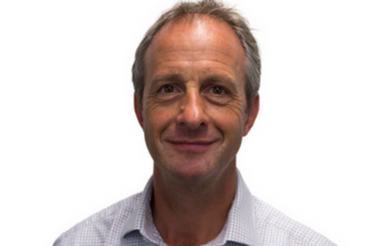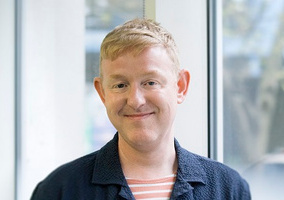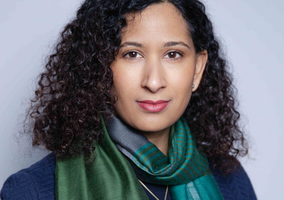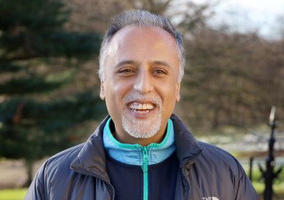Chris Askew, chief executive of Diabetes UK, first became involved in the charity sector after taking up a volunteer role at the MS Society.
“This is going to date me a bit, but the MS Society put an advert in a newspaper,” he recalls.
“I was looking for a way to meet people and get a bit more involved in things around me … so selfish reasons in a way. I wanted to get involved in something that I could do alongside work that would open up different friendships and experiences. It really did that - I met some fantastic people.”
Askew enjoyed volunteering much more than his day job, and through it, he gained a greater understanding of “what a charity was”.
“It just became very clear to me that I either carried on in my job in the City or I made the change. It was definitely a heart decision, not a head decision… But looking back it was the right decision to take,” he says.
‘We have to know and understand the needs of a huge group of people’
Askew made the move to the charity sector and took up roles as a fundraiser, including at Action for Children, Crisis, and diabetes charity JDRF.
He then joined what was then Breakthrough Breast Cancer, as director of fundraising and then as chief executive. After a merger with Breast Cancer Campaign, the charity Breast Cancer Now was formed.
“I think I really valued working in an organisation which was able to so closely map the needs and the interests of the group it was there to serve.”
Askew joined Diabetes UK in 2015, a decision which he says was driven by wanting to “affect better outcomes for people living with that condition”.
“I was interested in this huge condition that affects so many people, five million in this country, that is so little understood and for which the seriousness of the condition is so understated and so misrepresented.
“If you are living with diabetes you may get to see a clinician for a few minutes once a year, and for the rest of the time you are on your own.
“We have to know and understand the needs of a huge group of people, really diverse.”
More than 4.9 million people are currently living with diabetes in the UK, and 90 per cent of those have type 2 diabetes. An additional 13.6 million people are at increased risk of type 2 diabetes in the UK.
“Under the headline message that says we are interested in diabetes, we are an organisation that is deeply interested in and energised around tackling inequalities. We are an organisation that has to play close attention to, and has got strategic ambitions, around tackling stigma and misunderstanding and discrimination,” he says.
The charity also focuses on emotional health and wellbeing, as people often describe the “relentlessness of living with this incredibly channelling condition”.
Lived experience ‘deeply enriches’ Diabetes UK
Askew says the charity employs a lot of staff that live with diabetes directly themselves, who bring a “very direct and a very personal experience to their work”.
“We are incredibly privileged and fortunate to have that degree of experience. We have no expectations about the degree to which they want to share their personal experience but I know huge amounts of colleagues do bring that into work and we are deeply enriched as a result of that.”
He says this lived experience is included within the charity’s board of trustees and reference groups around all of its work. These include a council of people living with diabetes, a young persons’ council and others around a particular project.
“If we lose the ability or the appetite to bring that experience right into the heart of the strategy, we very quickly lose our way.”
‘We as a charity must be fundamentally and universally committed to being anti-racist’
“There is not a part of diabetes care which is not affected and impacted by inequalities,” says Askew. For example, deprivation can impact diabetes, and certain communities live at higher risk, and may not fare as well in their care as others.
“Technology has been a huge area of advancement in diabetes in recent years, incredibly exciting technology that is transforming the experience of what it means to live with diabetes, but access to that is not equitable – that is something we have to take to heart,” he says.
For example, Askew says a person from a minority ethnic group is less likely to be wearing current technology then their white counterpart and “we just cannot rest or be comfortable with that”.
He says this means the charity also needs to look inside its own organisation. It is important “we ourselves represent the diversity of experience” that “we are so committed to tackling”.
“We as a charity must be fundamentally and universally committed to being anti-racist, tackling inequality in all its forms outside our organisation and where that may happen within the organisation,” Askew says.
Diabetes UK, Askew says, has “created space in the organisation which did not exist before” and are taking “small but important steps”.
For example, the charity has launched an ethnic minority communities staff network, is working on an EDI plan, have implemented unconscious bias training.
Askew recognises that his charity has “insufficient diversity in senior roles” and is changing its recruitment practices to address this through anonymous shortlisting and sponsoring colleagues to join the Black charity leaders programme.
The charity has also taken steps to support staff that have experienced discrimination at work.
“One of the small steps that we've taken is to have a very straightforward way in which people can log microaggressions in the workplace and it's important we do that so we're ready to take action. So that we as an organisation can learn, understand more about the impact of those microaggressions and how that's to the detriment of our culture and not what we want to be as an organisation.”
Cost of living crisis: ‘Poverty is one of the biggest determinants of your health’
Diabetes UK launched a new strategy in January 2020, and the approach had been to pursue an outcomes-based strategy. The charity kept many of the same goals but “in the context of the pandemic”.
Askew says that people with diabetes were not more likely to contract Covid-19, but if they did they had a much higher chance of worse outcomes. A third of people who died from Covid-19 in England between March-May 2020 had diabetes.
Diabetes UK “hugely expanded” levels of helpline activity, materials, and campaigned to make sure people had protections at work.
During the pandemic, the charity were considering what would happen in really extreme cases for fundraising outcomes, but “as things happened we came through pretty even – a little down on the year before but our fundraising income held up.”
“Supporters responded to our call and kept true to their commitments to give – they really helped us,” he says.
“We had some strength already in areas that were going to become important during the pandemic. For example, for a number of years we have been working up a portfolio of virtual events over physical events, they appeared to be working better for our audiences.”
The charity had “never been big” in physical fundraising events and did not have a retail operation, “so we were insulated I think from some of those impacts.”
“Added to that our legacy income kept up very well; over 40% of our income in 2020 came from legacies and that figure tracked pretty much the same.”
So in 2020 and 2021 Diabetes UK “were able to operate with very little impact on our work” and the charity furloughed a “minimal number” of staff and made no redundancies, with some colleagues redirected to work on the helpline.
But Diabetes UK estimates around 60,000 diagnoses of type 2 diabetes were missed or delayed between March-December 2020 in the UK.
“As we have done through the pandemic, we have a lot of work to do, alongside other charities representing those with long term health conditions… To make sure we are speaking up for these people and doing all we can.”
Askew is concerned about being “over the threshold of the cost-of-living crisis” as “poverty is one of the biggest determinants of your health”.
“That exemplifies how as an organisation we have to be concerned about something wider than the clinical condition,” he says. For example, the prevalence of type 2 diabetes was 1.6 times higher in most deprived areas compared to the least deprived areas in England & Wales in 2020/21.
‘There is lots of opportunity for collaboration, particularly in the teeth of this crisis’
Diabetes UK is working with other organisations to call on health services, politicians and those that have any influence on long-term conditions to formulate changes.
The charity is part of the Richmond group which is a partnership of 14 health and social care charities that represent more than 15 million people living with long-term conditions.
Nonetheless, Askew says the charity hopes to collaborate more with other charities; for example, it is thinking about how to refer phone calls to other organisations, for example around debt advice.
He says, there is “lots of opportunity for collaboration, particularly in the teeth of this crisis”.
“We'll get through this by sharing information and sharing best practice,” he says.
“I think if you look at the combined record of achievement of the whole of the sector through the pandemic, we know we were a huge safety net for millions of people - and it will be the same in the cost of living crisis. I think there is a very exciting tale to tell about what charities do, what they have done.”
For example, in partnership with the Steve Morgan Foundation, Diabetes UK has launched Our Lives, Our Choices, Our Voices, a programme for young people aged 11 to 25 with type 1 diabetes.
Through the partnership, the Steve Morgan Foundation is investing £5m that will see Diabetes UK deliver a UK-wide peer support programme. It will be developed in collaboration with young people with type 1 diabetes.
This funding is in addition to the £50m partnership between Diabetes UK, the Steve Morgan Foundation and JDRF UK which was announced earlier this year.
Related Articles
Chris Sherwood: ‘We must challenge the perceptions of what a charity leader looks like’
RSPCA’s chief executive discusses his experiences in the sector and how charities can support staff from less privileged backgrounds to thrive
Farah Nazeer: ‘Charities need the courage of their convictions to speak out’
Farah Nazeer, chief executive at Women's Aid, speaks to Harriet Whitehead about how the charity is campaigning to challenge misogynistic culture and end domestic abuse
Arfan Hanif: ‘We don’t need an EDI strategy – we just live it’
You can say lovely words like diversity and inclusion but we don't have to say it - we are it, Hanif tells Sam Wait












